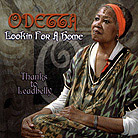December 2001
Leadbelly’s given name was Huddie Ledbetter. If you are familiar with "Midnight Special"-- "Let the Midnight Special shine its light on me / Let the Midnight Special shine its ever-lovin’ light on me," then a trace of Leadbelly is coursing through your veins. How about "Easy Rider"-- "Easy rider, see what you done done / Easy rider, see what you done done / You made me love ya, now your man done come"? No? Then surely "(Goodnight,) Irene" -- "… I’ll get you in my dreams." (This was cleaned up to "I'll see you in my dreams" by the Weavers, who popularized it, but Leadbelly wasn't the sort of man to be content with seeing his woman.) Leadbelly (1889-1949) grew up in what was still rough frontier land, in the countryside of northwest Louisiana and northeastern Texas. Odetta grew up in Los Angeles and studied music at Los Angeles City College. Obvious differences in their early experience notwithstanding, they shared a love of traditional songs. Both understood the aesthetic and sociopolitical power of such music and developed engaging performing styles that enabled them to convey that power to audiences. In their distinct ways, they made lasting contributions to the mid-20th-century folk-music revival. Odetta first performed professionally at about the time Leadbelly died, and she has often been called the "female Leadbelly." After releasing her first studio album in 1958, she later took part in the historic civil-rights march on Selma, Alabama, sang at the renowned 1963 March on Washington, and performed for President Kennedy and his cabinet on Dinner with the President, a televised civil rights program. She received the Presidential Medal of Arts in 1999. In Lookin' for a Home, Odetta has assembled 10 accompanists who play 12 different instruments. Essentially, an accomplished but restrained jazz band backs her up on each track, and a highly confident Odetta sings with, around, and over them, delighting in rhythmic, melodic, and textural subtleties and delivering original and unique versions of 15 songs written or made widely known by Leadbelly. At times singing over percussion only, at times softening her voice to the point where it’s barely audible, Odetta plays with the tunes in serious artistic fashion. She knows how to deliver the songs’ emotional and social content, but her overriding message is, "Ladies and gentlemen, this is music -- we are not whining about our lot here or drawing attention to ourselves; we are sharing in the joy our ears, our nervous systems, our minds make possible." Turn on your CD player, start up Lookin for a Home, sit back, and listen. From the first strains of "Irene" through "In the Pines" and "Roberta" to the concluding notes of "Midnight Special," Odetta will take you on one of the most delightful and least costly journeys you have experienced. GO BACK TO: |
 Odetta - Looking for a
Home (Thanks to Leadbelly)
Odetta - Looking for a
Home (Thanks to Leadbelly)![[Reviewed on CD]](../format/regcd.gif) The
expression "singing the blues" does not necessarily remind us of joy, but in her
latest CD, Lookin' for a Home (Thanks to Leadbelly), Odetta performs truly great
songs, strongly influenced by the blues, in a way that exudes the particular joy found in
mining first-rate material for gems that shine forth through a masterful voice. No wonder
Bob Dylan said, "The first thing that turned me on to folk singing was Odetta."
The
expression "singing the blues" does not necessarily remind us of joy, but in her
latest CD, Lookin' for a Home (Thanks to Leadbelly), Odetta performs truly great
songs, strongly influenced by the blues, in a way that exudes the particular joy found in
mining first-rate material for gems that shine forth through a masterful voice. No wonder
Bob Dylan said, "The first thing that turned me on to folk singing was Odetta."